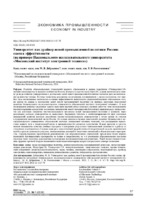| dc.contributor.author | Добрынина, М. В. | |
| dc.contributor.author | Растимешина, Т. В. | |
| dc.coverage.spatial | Минск | ru |
| dc.date.accessioned | 2024-02-06T10:16:58Z | |
| dc.date.available | 2024-02-06T10:16:58Z | |
| dc.date.issued | 2024 | |
| dc.identifier.citation | Добрынина, М. В. Университет как драйвер новой промышленной политики России: оценка эффективности (на примере Национального исследовательского университета «Московский институт электронной техники») = University as a Driver of New Industrial Policy of Russia: Efficiency Evaluation (Using the Case of National Research University of Electronic Technology) / М. В. Добрынина, Т. В. Растимешина // Наука и техника. – 2024. – № 1. – С. 67-79. | ru |
| dc.identifier.uri | https://rep.bntu.by/handle/data/140902 | |
| dc.description.abstract | Развитие образовательных учреждений высшего образования в рамках парадигмы «Университет 3.0» активно анализируется в научном сообществе России, Беларуси и других стран ЕврАзЭС, однако комплексную оценку роли российских университетов в достижении целей новой промышленной политики пытается дать незначительное количество ученых. В статье приведены результаты исследования, предпринятого с целью восполнить этот пробел. Цель исследования заключалась в оценке эффективности деятельности учреждений высшего образования с точки зрения их вклада в достижение целей новой промышленной политики (на примере ключевых показателей развития Национального исследовательского университета «Московский институт электронной техники»). В ходе исследования решены следующие задачи: выполнен краткий обзор основных научных работ по теме исследования; проанализированы содержание и основные направления новой промышленной политики; выявлена роль университетов как ключевых элементов институционального механизма новой промышленной политики и функций, через реализацию которых университеты ее выполняют. Выдвинута гипотеза о несбалансированности двух ключевых направлений развития ведущих российских научно-исследовательских университетов с точки зрения их участия в приращении экономической мощи России. На основе анализа основных показателей развития Национального исследовательского университета «Московский институт электронной техники» показано, что расширению присутствия данного вуза в национальной науке и промышленности уделяется существенно больше времени и средств, нежели повышению качества учебных программ и внедрению результатов инновационной активности в работу со студентами и аспирантами. Сделаны выводы о недостаточной проработанности теоретической модели, практических путей и средств транспорта ресурсов, инновационных решений и энергетики инноваций в образовательное пространство. Сформулированы практические рекомендации для образовательных учреждений: предложено более широко привлекать промышленные предприятия не только к аккредитации, но и к реализации образовательных программ (включая такие элементы, как практики и стажировки на промышленных предприятиях). Такой подход поможет усилить эффекты тройной спирали инноваций в подготовке инженерных кадров для реального сектора экономики. | ru |
| dc.language.iso | ru | ru |
| dc.publisher | БНТУ | ru |
| dc.title | Университет как драйвер новой промышленной политики России: оценка эффективности (на примере Национального исследовательского университета «Московский институт электронной техники») | ru |
| dc.title.alternative | University as a Driver of New Industrial Policy of Russia: Efficiency Evaluation (Using the Case of National Research University of Electronic Technology) | ru |
| dc.type | Article | ru |
| dc.identifier.doi | 10.21122/2227-1031-2024-23-1-67-79 | |
| local.description.annotation | Development of higher education institutions within the framework of the “University 3.0” paradigm is actively analyzed in the research community of Russia, Belarus and Euroasian Economic Community countries. However, a small number of scientists are trying to give a comprehensive assessment of the role of Russian universities in achieving the goals of new industrial policy. The paper presents the results of a study aimed at filling this gap. The purpose of the study was to evaluate the efficiency of higher education institutions in the context of their contribution to achieving the goals of the new industrial policy (using the example of key development indicators of the National Research University of Electronic Technology (MIET). During the study, the following tasks have been solved: a brief overview of the main scientific publications covering the research issue was completed; the content and main directions of the new industrial policy were analyzed; the role of universities as key elements of the institutional mechanism of the new industrial policy has been revealed, through the implementation of which universities carry out it. A hypothesis has been put forward about imbalance of two key areas of development of leading Russian research universities in terms of their participation in increasing the economic power of Russia. Based on the analysis of the main indicators of the development of the National Research University of Electronic Technology (MIET) it has been demonstrated that significantly more time and resources is devoted to expanding the presence of this university in national science and industry than to improving the quality of educational programs and introducing the results of innovative activity into work with students and graduate students. Conclusions have been made that theoretical model and practical ways and means for transporting resources, innovative solutions and innovation energy in the educational space are not sufficiently explored. Practical recommendations for educational institutions are formulated: it is proposed to involve industrial enterprises more widely not only in accreditation, but also in the implementation of educational programs (including such elements as internships and internships at industrial enterprises). This approach will help to strengthen the effects of the triple spiral of innovation in the training of engineering personnel for the real sector of the economy. | ru |

